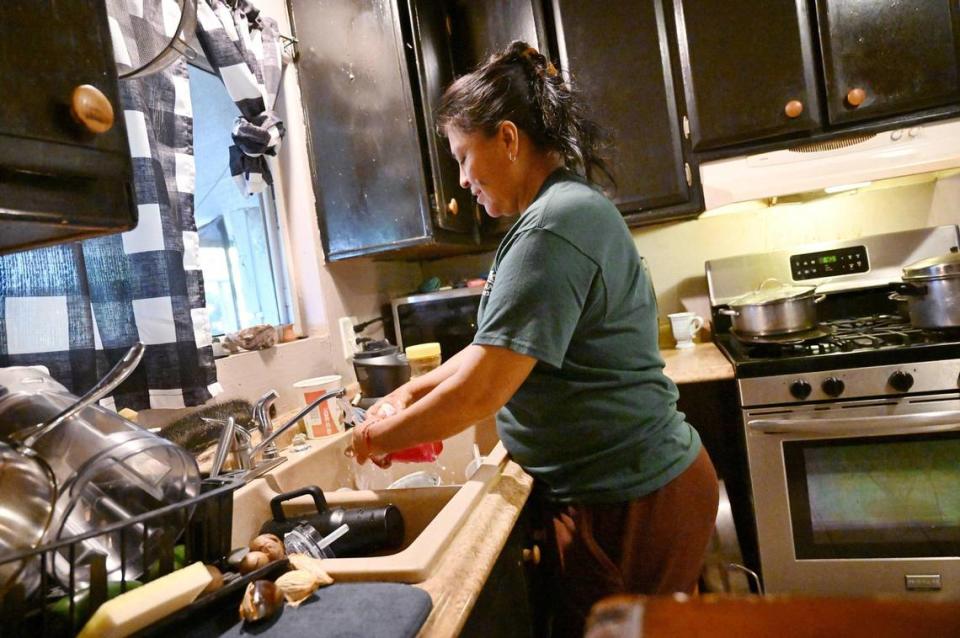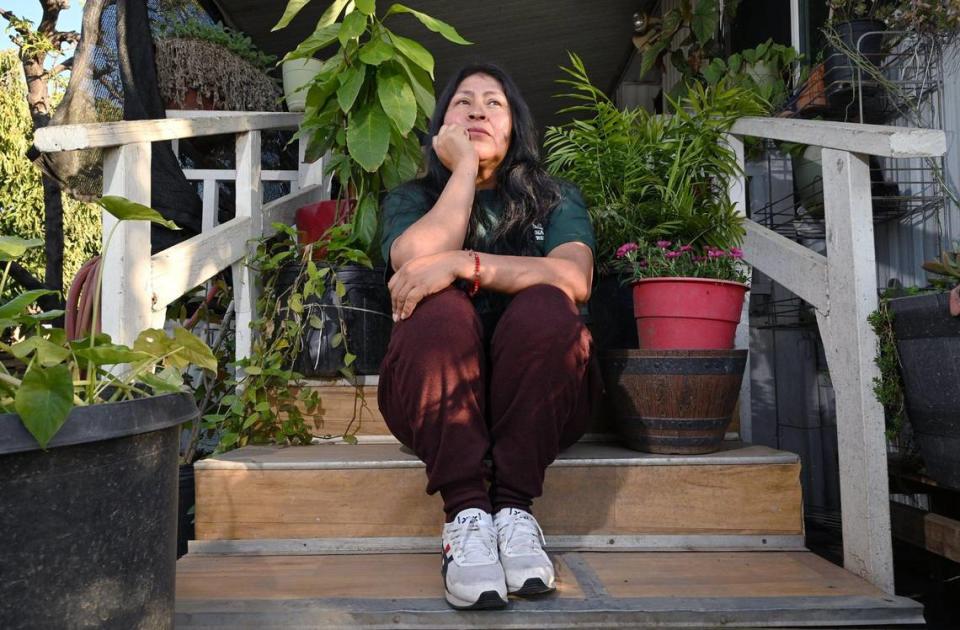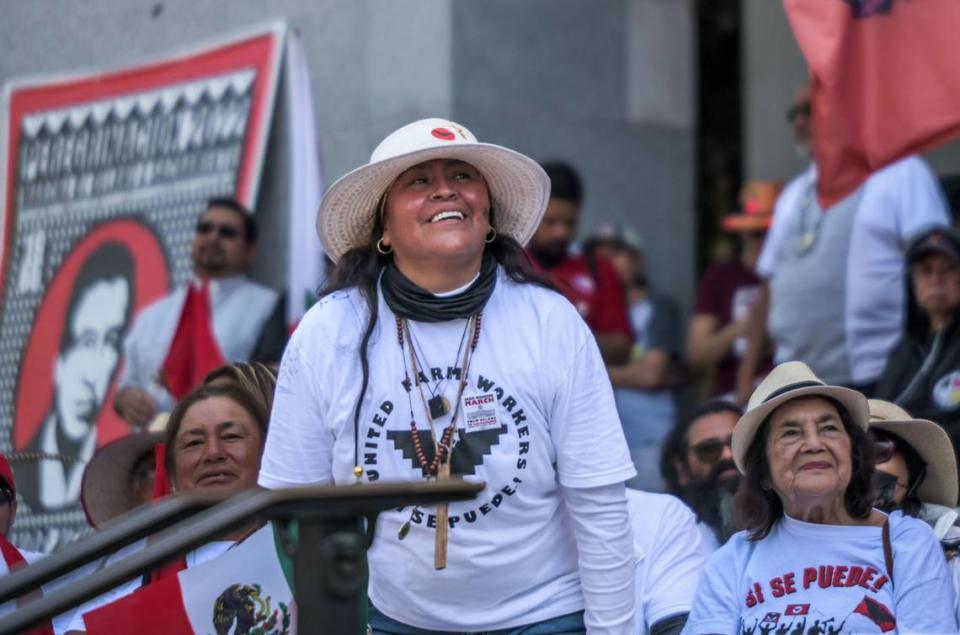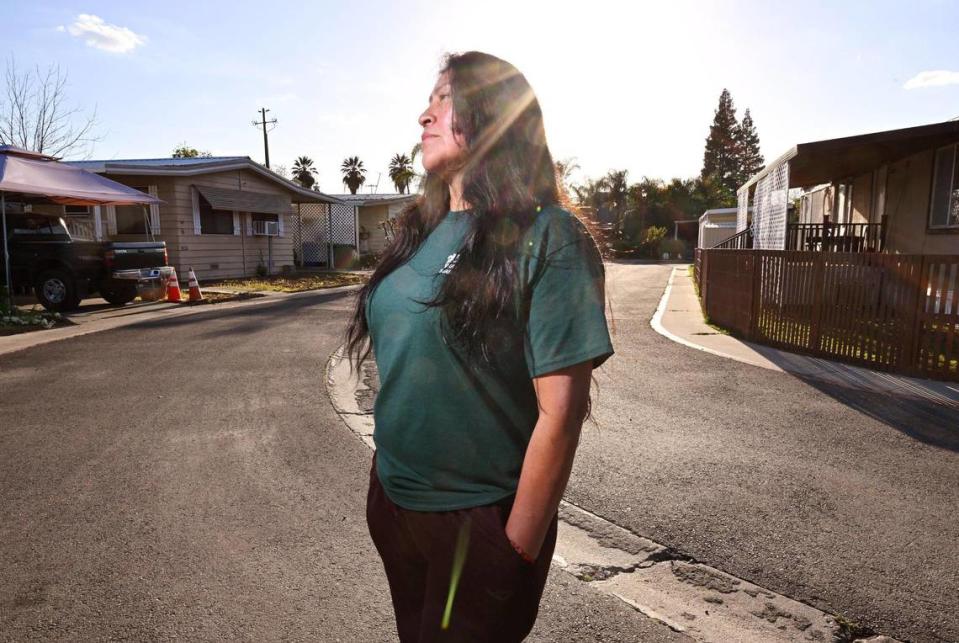Latinos are growing frustrated and angry about migrants and the border. Here’s why
Xochilt Nuñez is not the typical person who comes to mind when thinking about critics voicing their displeasure with U.S. immigration policy or the influx of migrants.
Nuñez crossed the border into California in 1999. She left her hometown of Morelia in Michoacán, Mexico, in search of a better life. The trip took her just over a week, during which she spent days without food and water.
Days after crossing, still exhausted and dehydrated, Nuñez began working at a carwash in San Diego. Soon after, she took on a second job in construction. Her hope then was to save enough money to own a home — her version of achieving the American Dream.
Today, people from around the world come across the U.S. border, many just as eager to work and potentially reach that dream.
Yet, Nuñez — now 53, a farmworker and a single mother of three — has mixed feelings about the overwhelming majority of these migrants. She uses words such as “anger,” “frustration” and “jealousy,” when asked to describe her feelings toward the migrants. All the while, she shares the same undocumented status and participates in grassroots activism for immigration reform.
“Right now, this immigration is out of control,” Nuñez said. “And now, they don’t come to work. They come to live from the system.”

She represents an increasing number of Latinos — both native born and undocumented — who, according to several polls, are concerned with the immigration system and, at times, direct their frustration at the arriving migrants.
Their views are rooted in a litany of reasons, from decades-long failed immigration reform and economic inequality to xenophobia and the disconnect amplified by the online misinformation. The nation has a long history of anti-immigrant sentiments, even among Latinos.
“These conversations on immigration are happening as California is more unequal than it’s ever been…but it’s easy to sort of pass the blame on to newcomers,” said G. Cristina Mora, an associate professor of sociology at UC Berkeley. “This is not a new story. It’s always been there.”
For Nuñez , her frustration mainly stems from a belief that the system is hopelessly rigged. More than 25 years after arriving in the country, like many farmworkers, she has no legal status.
And instead of the home she longed for, Nuñez lives with her two youngest children in a mobile home park in Orosi, a small rural town 45 minutes from Fresno. Her oldest son recently joined the Army, a decision he made hoping to increase his mother’s chances of securing citizenship.
To her, the new arrivals are receiving benefits that she and other immigrants were never awarded. Those views, while conflated in both truth and misinformation, highlight growing tension caused by an immigration system pitting immigrant Latinos against each other.
“We are hardworking people and good people,” Nuñez said. “But the problem is that the government doesn’t see us.”

‘There is a deep history’
For years, California has been at the forefront in protecting people without legal status. Politicians passed laws to allow undocumented residents, like Nuñez, to apply for driver’s license, receive protection from immigration authorities and access healthcare.
Still, immigration experts expressed little surprise discussing recent California polling that shows Latino support for migrants seemingly eroding. Perhaps most notably, a January 2024 UC Berkeley Institute of Governmental Studies poll found that 63% of the state’s Latinos consider undocumented immigrants to be a major or minor “burden.”
“People are surprised that Latinos would take this stance, but there is a deep history,” said Mora, who is also the IGS co-director.
As far back as the 1960s, some Latinos, including civil rights icon Cesar Chavez, took a hard stance against undocumented immigrants.
In his push for farmworker rights, Chavez believed securing the border would prevent employers from using undocumented workers as strike breakers which undermined the wages of Latino farmworkers.
Kevin R. Johnson, the dean of UC Davis’ School of Law, said Chavez initially would encourage union members to patrol the border and prevent undocumented workers from crossing. Chavez’s position changed in the 1970s, and he advocated against the deportation and for the “amnesty” of undocumented residents.
“Chavez changed, but a lot of times there have been concerns with Latinos in this country, as well as citizens in this country, fearing attacks by workers undercutting the wage scale,” Johnson said.
Decades later, some Latinos rallied for Proposition 187 — the famous 1994 ballot measure seeking to prevent undocumented immigrants from accessing social services. Though it never went into effect, about 23% of Latino voted in favor of the measure, according to exit polls.
“One of the things that immigration teaches is that Latinos are not a monolithic community,” Johnson said. “It’s a very diverse community, with conservatives and liberals.”
‘The American Dream is dead’
So, is Nuñez one of those conservative Latinos? Did she wake up one day and start disliking migrants? No. Her beliefs took shape over a span of many years, and recently were accelerated by government inaction.
In 2003, following years of working two jobs, Nuñez achieved her dream of a home. But the triumph was short-lived. Less than four years later, in the midst of the U.S. financial crisis, Nuñez lost her job and eventually the home.
Without many options, Nuñez used her remaining money to buy a modest trailer home and moved to Orosi with her three children. She began working in the fields, where she has spent the last 16 years stuck living paycheck to paycheck.
Earlier this year, Nuñez was hit with another blow.
Her longtime employer, Prima Wawona, one of the largest growers and packers of tree fruit in California, laid off her and thousands of workers off.
“The American Dream is dead,” Nuñez said.
These feelings of disillusionment among Latinos are common, particularly in California, according to Mora.
Latinos living in the state are overrepresented in low-income brackets, more likely to live in poverty and struggling to buy homes. All together, the frustration can spill over, directed at people portrayed as worsening the problem.
Nearly 70% of California Latinos in a February 2024 PPIC poll said the situation at the border is a crisis or a very serious problem.

Those feelings extend across the nation as well, with nearly half of Hispanics stating their belief in the debunked claim that migrants seeking to enter the U.S. are leading to more crime, according to a February Pew Research report.
“You really see this happen during economic trends that are around increases in inequality and inflation,” Mora said.
‘Immigrants against immigrants’
In nearly every sense of the word, Nuñez is liberal. She routinely advocates for immigrant and farmworker rights.
Nearly two years ago, she walked roughly 350 miles from Delano to Sacramento in support of a farmworker unionization bill. After the march, she spent weeks alongside other farmworkers overseeing a vigil in front of the Capitol to persuade Gov. Gavin Newsom to sign the legislation.

When the governor finally did sign in late September 2022, he handed a copy of the bill to a teary-eyed Nuñez. She called the interaction, and subsequent hug with Newsom, one of the best moments of her life.
The next year, Nuñez traveled to San Jose for another 40-mile march to demand congressional action on a pathway to permanent residency for millions stuck in legal limbo. Months later, she participated in another march in Colorado while braving the December cold.
But this same activism is partly why she now holds generally negative views of the migrants.
Through her work, she learned about the Immigration Reform and Control Act of 1986 — the last comprehensive immigration reform enacted by the U.S. government. She learned about Congress’ continual failure to pass meaningful reform for her and the millions of other longtime undocumented residents stuck in limbo.
Nuñez struggles to come to terms with a system which can’t help undocumented residents like herself, who have paid taxes for years, yet provides shelter, debit cards and expedited work permits, to some recent arrivals.

“We have so many people with 30, 40 years living here,” Nuñez said. “People who are tired, old, sick and dead. Unfortunately they can’t have dignified retirement after all the years that they gave their youth, all their bodies, all their existence to get ahead.”
Immigration advocates acknowledge these feelings from undocumented residents are at an all-time high, and they say the frustration is misguided.
The government and politicians, who have neglected the immigrant community for years, are to blame, said Angelica Salas, executive director of the Los Angeles-based organization Coalition For Humane Immigrant Rights. Salas said the current dynamic results from pitting “immigrants against immigrants.”
“Our politicians are absolutely responsible for a lot of what’s happening ,” Salas said.
The disconnect between immigrant populations can stretch even further due to political rhetoric and its media coverage. The media will often play into the issue of immigration to garner attention, which becomes a “vicious cycle,” said Ceclia Menjívar, a professor of sociology at UCLA who specializes in immigration and social networks
That content ends up shaping the perceptions of the public, including people with immigrant backgrounds who might want to distance themselves from negative stereotypes.
“I am not surprised that people will want to separate themselves from current negative stereotypes, even if they are in the same legal status, even if they are in the same situation,” Menjívar said.
‘Anger and frustration is misguided’
For her part, Nuñez recognizes the true culprits of the problem: “Republicans and Democrats who can’t come to an agreement.” Still, she can’t help but feel like the current system benefits communities who are not coming with the same passion for work.

A flashpoint of Nuñez’s frustration began on social media, where her TikTok feed highlights the most negative stereotypes of migrants.
Among them are the videos of Leonel Moreno, who goes by the name of Leito Oficial. Moreno, a native of Venezuela, has generated interest and hatred among Latinos across the country. TikTok recently suspended Moreno’s account, though his Facebook and Instagram are still active.
In videos with millions of views, he has boasted about begging from strangers on the streets, living off money distributed by the government and commented on how easy it is to steal from supermarkets. Most recently, Moreno went viral and was covered by Fox News and other American media for a video encouraging migrants to break into homes and gain possession due to squatting laws. The New York Post reported he was arrested Friday by ICE.
“That is not the kind of migrants we need in this country,” said Nuñez.
Though Moreno’s videos likely help him earn money and are meant to play into a character, they have real world consequences, said Carlos Eduardo Espina, a content creator who has produced videos pushing back against Moreno. He estimated Moreno likely makes between $5,000 to $20,000 per month, given the number of views on his videos.
“He’s reached national television, politicians are talking about him and he’s, in a sense, become the symbol of the bad immigrant,” Espina said.
These types of videos have become more prevalent, and determining who is being truthful is hard to differentiate.
The spillover is seen in the comments, Espina said, with Mexican and Central American communities using negative stereotypes to express their disdain for recent arrivals and some even calling for the re-election of former president Donald Trump so deportations can increase.
“People are right to be angry,” Espina said. “They have a right to be frustrated. But a lot of times that anger and frustration is misguided.”
Nuñez’s frustration has reached a point that she doesn’t want Trump or current president Joe Biden to win a next term. Both candidates and major political parties have failed her and millions of others, she said.
She hopes the next president has a “heart” for undocumented residents, who have spent decades working and paying taxes for the nation. She wants them to know people like her are fed up of waiting for immigration reform. They’re tired of not feeling appreciated.
“We’re suffering, and they don’t see us,” Nuñez said.

